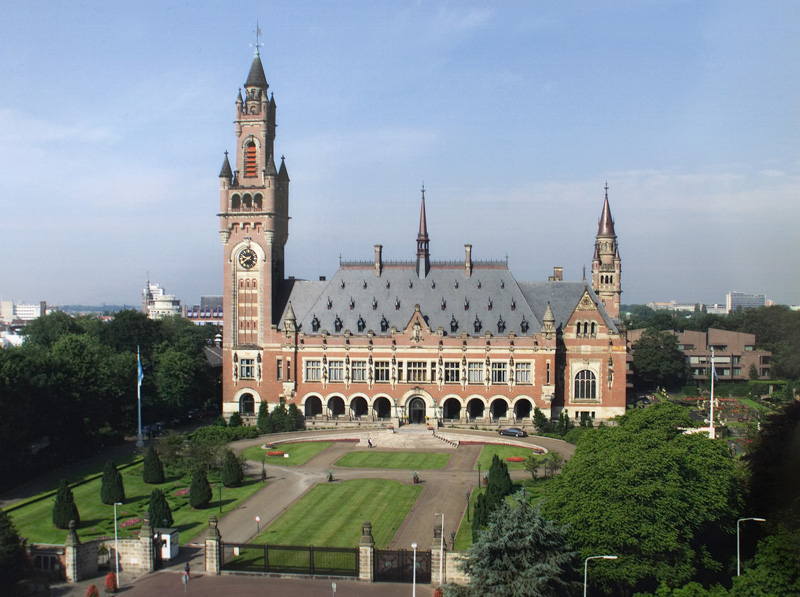
2023-24
LL278: PUBLIC INTERNATIONAL LAW
COURSE GUIDE
Course Convenor
Gerry Simpson
Cheng Kin Ku Building (formerly New Academic Building)
Floor 5, Room 5.12
Course Aims
This course provides an introduction to the concepts, principles, institutions, history and argumentative structure of public international law. Overall, the aim of the course is to lay the basis for an informed assessment of the contribution, limits and possibilities of international law as a language of, and force in, world affairs.
We begin in Week 1 by asking what kind of legal order we are dealing with (in the particular context of recent challenges to the whole concept of international legality itself).
In the first set of lectures on The International Legal Order, we think about how international legal norms emerge (through custom and treaty) (Lectures 2 and 3) among entities known as sovereign states (Lecture 5), in something called an ‘international society’, and how those states seek to resolve disputes in that (anarchic) order (Lecture 4).
After reading week, we return to the origins of the system. Lectures 6 and 7 concern the historical emergence of this system in European colonial arrangements across the modern period and in Lecture 8, we consider the emancipatory potential of the principle of self-determination as a response to these arrangements.
In a third set of lectures, Violence, we contemplate an ancient problem: how to control the use of kinetic force in a decentralised society. This comprises the legal articulation of decisions to go to war (Lectures 9 and 10) historically known as the jus ad bellum, and the regulation of the conduct of hostilities during armed conflict (jus in bello), in the context of the recent development of a body law concerned with mass atrocities in and outside war (international criminal law) (Lectures 11 and 12).
A fourth set of lectures (Lectures 13 and 14) on the political economy of the global system examines international trade, international investment, and the WTO. In section five, Fields, we introduce two important specialist areas of international law: international human rights law and environmental law and climate change (Lectures 15, 16, 17).
We will conclude with a set of Overviews of international law (Lectures 18-20).
Teaching arrangements
The course comprises two hours of in-person lectures weekly in Michaelmas and Lent Terms between 4 and 6 every Thursday with one-hour classes at times to be confirmed and beginning in week two. Classes will follow broadly the same order of topics as the lectures from the week before, and will provide an opportunity to discuss these topics in smaller groups.
It is important that you attend both lectures and classes, that you have read the assigned readings for each, and are prepared to take part in the discussion.
The lecturers this year will be Chaloka Beyani, Oliver Hailes, Susan Marks, Mona Pinchis-Paulson, Marie Petersmann and Gerry Simpson.
Classes will be taught weekly in Michaelmas by Oliver Hailes and Susan Marks and in Lent by Devika Hovell and Gerry Simpson.
Assessment and Requirements
Summative assessment is 100% by final examination in the Summer Term.
Details of formative assessment will be provided by class teachers. Please do not submit written work to the lecturers.
Course Schedule
Note that dates refer to the Monday of each week. Lectures are on Thursdays. So for the first week, the lecture will be delivered on Thursday 28th September.
MICHAELMAS TERM
Lectures will take place in CLM 2.02 between 4-6pm every Thursday.
1. The International Legal Order: Introduction 25 Sept [GS]
2. The European Crisis and the Sources of International Law 2 October [GS]
3. The International Legal Order: The Sources of International Law 9 Oct [GS]
4. The International Legal Order: International Dispute Resolution 16 Oct [DH]
5 The International Legal Order: Statehood and Sovereignty 23 October [GS]
READING WEEK 30 October- 3 November
6. History: Colonialism, International Law 6 Nov [SM]
7. History: Colonialism, International Law 13 Nov [SM]
8. History: Self-Determination 20 Nov [GS]
9. Violence: International Law on the Use of Force I 27 Nov [GS]
10. Violence: International Law on the Use of Force II 4 Dec [GS]
LENT TERM
Lectures will take place in CKK.LG.01
1. Violence: International Criminal Law I (Crimes) 15 Jan [GS]
2. Violence: International Criminal Law II (Jurisdiction) 22 Jan [GS]
3. Economy: International Economic Law 29 Jan [MPP]
4. Economy: International Economic Law 5 Feb [MPP]
5. Economy: International Investment Law 12 Feb [OH]
READING WEEK 19-23 Feb
6. Fields: International Human Rights Law I 26 Feb (CB)
7. Fields: International Human Rights Law II 4 March [CB]
8. Fields: International Environmental Law 11 March [Marie Petersmann]
9. Overview: TBC 18 March [GS] 10.
10. Overview: Great Thinkers 25 March [GS]
Readings
Handouts setting out the reading for each topic will be posted on the Moodle page in advance of each lecture.
For treaties and other primary documents, please buy and bring to each class: M. Evans, Blackstone’s International Law Documents. In addition, it is advisable to buy M. Evans (ed.), International Law (5th ed., 2018). You might wish also to consider using D. Harris, Cases and Materials on International Law (8th ed., 2015).
Other good general introductions to international law include:
H. Charlesworth and C. Chinkin, The Boundaries of International Law (2000)
J. Crawford, Brownlie’s Principles of Public International Law (8th ed., 2012)
M. Shaw, International Law (9th ed., 2021)
V. Lowe, International Law (2007)
M. Koskenniemi, From Apology to Utopia (rev. ed., 2005)
Useful websites
United Nations www.un.org
International Court of Justice www.icj-cij.org
International Criminal Tribunal for the Former Yugoslavia www.un.org/icty/
International Criminal Tribunal for Rwanda www.un.org/ictr/
International Criminal Court www.icc-cpi.int
UN High Commissioner for Human Rights www.ohchr.org
European Court of Human Rights www.echr.coe.int/echr
Lauterpacht Centre for International Law www.lcil.cam.ac.uk/
American Society of International Law www.asil.org
University of Chicago www.lib.uchicago.edu/~llou/forintlaw.html
European Journal of International Law: www.ejil.org
Blogs
www.ejiltalk.org
www.ilreports.blogspot.com
www.opiniojuris.org
